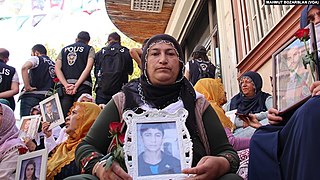 W
WThe 2018 Syrian-Turkish border clashes began on 31 October 2018 when the Turkish Armed Forces began to shell People's Protection Units (YPG) positions near the cities of Kobani and Tell Abyad as well as surrounding villages. Turkey views the YPG as an extension of the outlawed Kurdistan Workers' Party (PKK), which has been waging an insurgency in Turkey for over 40 years.
 W
WThe Kurdish–Turkish conflict is an armed conflict between the Republic of Turkey and various Kurdish insurgent groups who have either demanded separation from Turkey to create an independent Kurdistan, or attempted to secure autonomy and greater political and cultural rights for Kurds inside the Republic of Turkey.
 W
WOperation Olive Branch was a cross-border military operation conducted by the Turkish Armed Forces and Syrian National Army (SNA) in the majority-Kurdish Afrin District of northwest Syria, against the People's Protection Units (YPG) of the Syrian Democratic Forces (SDF). The air war and use of major artillery ended as the Arab and Turkmen militias of the SNA entered the city of Afrin on 18 March 2018, and the SDF insurgency in Northern Aleppo began.
 W
WThe 1996 Tunceli bombing was a suicide bombing targeting a group of 60 unarmed military personnel who was there for a flag raising cerenomy in Tunceli, Turkey on 30 June 1996. The explosion resulted in deaths of eight soldiers and Zeynep Kınacı, who was identified as the assailant. 29 soldiers were injured in the attack. It was the first suicide bombing in history of Turkey.
 W
WThe 2016 Elazığ bombing was a car bombing targeting a police station in Elazığ, Turkey on 18 August 2016. Attack was perperated by Kurdistan Workers' Party (PKK). Six people including one perpetrator died in the attack and 217 others were injured. Two people were arrested related to the attack.
 W
WThe August 1986 Turkish incursion into northern Iraq, by the Turkish Air Forces and Turkish Land Forces, began on 15 August 1986, when the Turkish Military bombed Kurdistan Workers' Party (PKK) targets in northern Iraq and Turkish troops crossed the Iraqi border as a respond to PKK attack in Uludere, Hakkari on 12 August 1986 which killed 12 Turkish soldiers and injured 10 others.
 W
WThe December 2007 Turkish incursion into northern Iraq, by the Turkish Air Force, began on 16 December 2007, when the Turkish Military bombed Kurdistan Workers' Party (PKK) targets in northern Iraq.
 W
WThe number of Kurdish villages depopulated by Turkey is estimated at around 3,000. Since 1984, the Turkish military has embarked on a campaign to eradicate the Kurdistan Workers Party, a militant Kurdish opposition group. As a result, by the year 2000 some 30,000 people have died, and two million Kurdish refugees have been driven out of their homes into overcrowded urban shanty towns.
 W
WThe March 1987 Turkish incursion into northern Iraq, by the Turkish Air Force, began on 4 March 1987, when the Turkish Military bombed Kurdistan Workers' Party (PKK) targets in northern Iraq. 30 war planes were used in the operation and 3 major PKK camps was bombed.
 W
WThe March 2016 Turkish incursion into northern Iraq, by the Turkish Air Forces, began on 18 March 2016, when the Turkish Military bombed Kurdistan Workers' Party (PKK) targets in northern Iraq in response to the February 2016 and March 2016 bombings in the Turkish capital city of Ankara.
 W
WThe Mothers of Diyarbakır is a group who gathers daily for a sit-in protest against the Peoples' Democratic Party (HDP), demanding the return of their children who allegedly were deceived or kidnapped by the Kurdistan Workers' Party (PKK). The sit-in takes places outside the Diyarbakır headquarters of the HDP. In contrast to the Saturday Mothers in Istanbul, who also ask for the whereabouts of their relatives and whose protests face oppression from the police, the Mothers of Diyarbakır group are supported by the Turkish police who escort them home in the evenings, and are protected by the local state prosecutor. The pro-government media also support the group.
 W
WThe Solution process, also known as Peace process or the Kurdish–Turkish peace process, was a peace process that aimed to resolve the Turkey–PKK conflict as part of the Kurdish–Turkish conflict (1978–present). The conflict has been ongoing since 1984 and resulted in some 40,000–100,000 mortal casualties and great economic losses for Turkey as well as high damage to the general population.
 W
WThis is the timeline of the Turkish-Kurdish conflict. The Kurdish insurgency is an armed conflict between the Republic of Turkey and various Kurdish insurgent groups, which have demanded separation from Turkey to create an independent Kurdistan, or to have autonomy and greater political and cultural rights for Kurds in Turkey. The main rebel group is the Kurdistan Workers' Party or PKK, which was founded on November 27, 1978, and started a full-scale insurgency on August 15, 1984 when it declared a Kurdish uprising. Apart from some extended ceasefires, the conflict has continued to the present day.